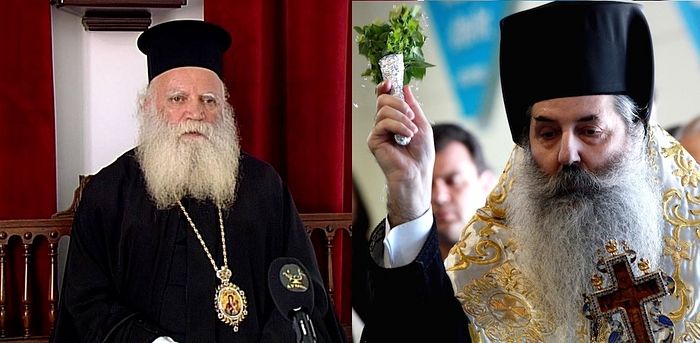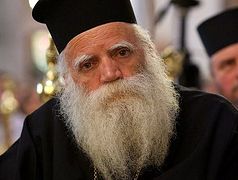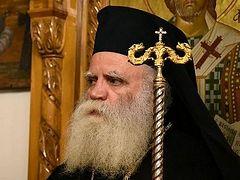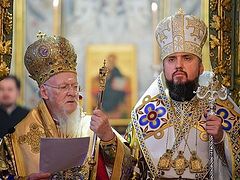Athens, October 14, 2019
 Met. Seraphim of Kythira (left), Met. Seraphim of Piraeus (right). Photos: agionoros.ru
Met. Seraphim of Kythira (left), Met. Seraphim of Piraeus (right). Photos: agionoros.ru
While media reports have stated that the Bishops’ Council of the Greek Church resolved to recognize the schismatic “Orthodox Church of Ukraine” on Saturday, drawing on Metropolitan Hierotheos Vlachos’ statements to the press, two prominent hierarchs of the Greek Church say this is not true.
Both Metropolitans Seraphim of Piraeus and Seraphim of Kythira, both of whom have addressed the Ukrainian issue several times before, have issued statements in the wake of Saturday’s session, stating that the issue of recognizing the OCU was not put to a vote and that the hierarchs simply reaffirmed the Holy Synod’s earlier decision.
In August, the Holy Synod of the Greek Church “recognize[d] the Ecumenical Patriarch’s canonical right to issue the status of Autocephaly,” though as OrthoChristian wrote at that time, it was unclear if the Synod was speaking of Constantinople’s rights in general or specifically in the Ukrainian situation.
The Synod also recognized “the privilege of the primate of the Church of Greece to further deal with the question of recognition of the Church of Ukraine.”
According to both Seraphims, these recognitions were affirmed by the Bishops’ Council, and nothing more.
In fact, as Met. Seraphim of Kythira emphasizes, Metropolitan Daniel of Kaisariani pushed for a vote to take place, but that did not happen. But, he writes, decisions are made in the Orthodox Church by a vote, so if there was no vote, how could there have been a decision?
Therefore, he laments that spin was immediately put on the Council’s proceedings, and that Met. Hierotheos told the press that the Council’s decisions imply that the Greek Church has recognized the OCU.
Of course, the news spread quickly throughout the Orthodox world, and hierarchs from several Local Churches have already offered formal and informal reactions to the supposed decision of the Greek Church.
While Abp. Ieronymos recommended recognizing the OCU, Met. Seraphim of Kythira argues that the authorization of Abp. Ieronymos to handle the issue further is open to interpretation. Will the matter simply be settled by Abp. Ieronymos concelebrating with or commemorating Epiphany Dumenko in the Liturgy?
Met. Seraphim asks: With this privilege, will Abp. Ieronymos manage, wisely and prudently, the burning canonical and ecclesiological issue which has arisen such that it will be solved in a conciliar and canonical manner with the other primates, or he will proceed to solve it on his own?
Moreover, Met. Seraphim of Kythira writes that the media’s confused reports of only 7 metropolitans standing against recognition of the OCU were a great mistake, one he hopes that was made unintentionally. In fact, he writes, many hierarchs are against it. A few openly spoke against it, while others did not feel the need to repeat what was said by others, the hierarch of Kythira writes. He notes that there are hierarchs from the “New Lands,” which are officially within the jurisdiction of Constantinople, who also oppose autocephaly for the OCU, but who did not speak up because they do not want their view to become public.
In particular, Met. Seraphim of Kythira notes that Met. Seraphim of Piraeus went deeply into the issue, exploring it from a canonical and ecclesiological perspective.
The Metropolitan of Kythira concludes with his own position on that matter, that the hierarchs have totally ignored a letter that came to them from His Beatitude Metropolitan Onuphry of Kiev and All Ukraine, the primate of the canonical Ukrainian Church, and they have ignored the fact that the Patriarch of Constantinople cannot receive a petition from another Local Church.
This second point is also made by Met. Seraphim of Piraeus, as he has before, emphasizing that all of Constantinople’s actions in Ukraine are illegitimate because they were made outside of its own canonical territory and beyond its canonical rights. Only an Ecumenical Council can make such decisions, the hierarch of Piraeus writes.
Met. Seraphim of Kythira ends by calling upon the Archbishop and the Patriarch to avoid any other actions and to wait for a pan-Orthodox decision.
Moreover, a source within the Greek Church also told RIA-Novosti that the hierarchs’ decision does not mean recognition of the OCU, as there was no vote directly on recognition. He says, instead, that will come only when Abp. Ieronymos begins to commemorate Epiphany Dumenko at the Liturgy.
“Everything that is being written right now is aimed at serving the interests of, and is mobilized to promote the decision of the Ecumenical Patriarchate,” the source said.
In his opinion, the position of certain hierarchs who are advocating for recognition of the OCU’s autocephaly, such as Met. Hierotheos (Vlachos), who immediately portrayed the Council’s decisions as a recognition of the OCU, do so because of their desire to take up the primatial throne.
The source also said that the recognition of the OCU will lead to a schism in the Greek Church, and he expressed the hope that the Russian Church will not rush to make a decision until the situation is fully clarified.




